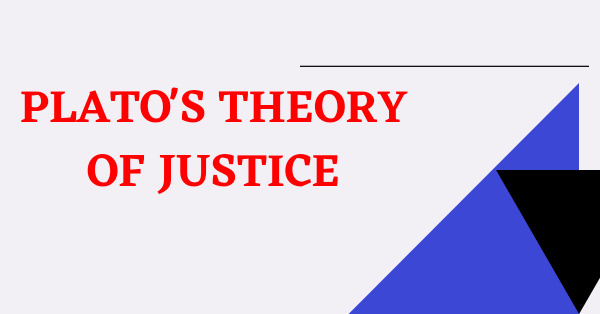Introduction
•Plato wanted to make Athens, an ideal state and he Considered Justice as the most important element for the establishment of an Ideal State. • Plato gave Theory of Justice in his book “The Republic”, also subtitled as Concerning Justice because discovering the principles of Justice is the central problem of Plato’s “Republic”,”
Background
Before giving his theory of Justice, Plato first rejected all the theories of Justice existing at that time, by giving proper reasons.
a) Traditional Theory of “Cephalus” and “Polymarchus”
• Cephalus : “Justice is to speak the truth and pay one’s debt”
Plato’s Criticism – if someone reveals the secret of his country by speaking truth to enemies then Justice can’t establish. ·Polemarchus:” Justice Consists giving a person his due, which implies doing good to friends and evil to enemies. Plato’s Criticism – doing injustice to anyone can’t be part of Justice.
b) Radical Theory of Thrasymachus ،،
Thrasymachus : Might insight right and Justice is the interest of stronger. Government make laws to serve they won interests and whatever serves their interest is Justice”
Plato’s Criticism – The true function of a physician is to cure the patient, not to make money. Similarly, government is a type of organisation whose goal is to ensure the well-being of the governed.
C) Pragmatic Theory of Glaucon • Glaucon : Justice in the child of fear. It is the need of week who constitutes the majority of Society”
Plato’s Criticism – Justice can’t be established through fear or power, it should be done naturally.
You can also Read this Post- Plato’s theory of education
Two forms of Justice
Plato described two forms of Justice:- Justice at the Individual level and Justice at the social level.
a) Justice at Individual level:
Every soul has 3 elements Reason, Courage & Appetite. But these three elements are not in equal proportion in every soul. So, to establish Justice at the individual level, people should choose their profession on the basis of the dominant element of their soul.
b) Justice at the Social level :
when every individual will do work according to the dominant element of their soul then, the whole society will be divided into 3 classes Ruler class, soldier class, and Producer class. Justice would establish at the social level when every class will function according to their dominant spiritual quality with full potential. & when Men of Gald would rule over Men of silver and Copper & no one would interface in the task performed by others. According to Plato: “A Just State is where society divided into 3 classes, each Performing task according. natural attributes i.c. to the spiritual quality of soul and not interfering in other’s task.
State is individual Writ Large:-
This statement means, State is a bigger version of the individual. Plato: State doesn’t come out of oak or rock, it inheres in the mind of people living in the State. ”
The nature of the State will depend on the character of the individual. “Like Man, Like state” if every man is Just, State will become Just automatically.
For Plato, principles governing the life of the individual (ethics) & principles governing state (Politics) can’t be different from each other. The idea of the good life and good political life can’t be separated from each other.
Criticism of Plato’s Theory of Justice
Criticizers criticize Plato’s theory of justice by giving the following arguments :
a) Justice should have been a legal concept.
b) Overall development of a person is not possible because according to this theory, a person has to do a single work for a lifetime. He can’t change his profession
C) Concentration of Power in a single class (Philosopher class) is not correct.
d) Division of Society in different classes may cause class war.
e) This theory is putting less emphasis on the development of individuals and more focus on the State.
 |
| Plato’s theory of Justice notes |
